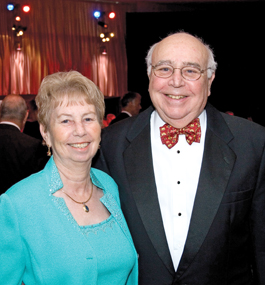Repairing the World, Pioneering New Drug

Sherwood Gorbach ’55 with his wife, Judith Gorbach ’58
Sherwood Gorbach ’55 hasn’t been in a Brandeis classroom in a half-century, yet he credits the lessons he learned at his alma mater for aiding in his recent discovery of a breakthrough drug to treat diarrhea.
The world-renowned infectious disease researcher was profiled in The New York Times for his role in developing Dificid, the first new medicine in 25 years approved to treat diarrhea caused by Clostridium difficile, a bacterium that is a leading cause of hospital-acquired infection. The Food and Drug Administration approved the drug on May 27.
“This type of discovery is the ambition of every physician,” says Gorbach, a longtime professor at Tufts University School of Medicine and the chief scientific officer at Optimer Pharmaceuticals in San Diego, which developed Dificid. “I feel fortunate that I was able to participate and help people in this way.”
After graduating from Brandeis, Gorbach worked for six months in his family’s insurance business and then was drafted into the Navy. During his military service, he had an epiphany.
“I came to realize that I was deeply moved by my experience at Brandeis and what it taught me about tikkun olam (repairing the world) and the importance of following your dreams,” Gorbach says. “Working in the insurance business wasn’t going to allow me to reach my goals.”
Gorbach returned to Brandeis as a special student in 1957 to complete the science courses required for medical school. He earned straight As and was accepted into five medical schools before enrolling at Tufts.
Gorbach began his quest for treatments in 1971 when he learned of some patients in New Zealand who developed severe cases of diarrhea and bowel inflammation after being administered an antibiotic. In the ensuing 40 years, he focused on discovering the cause of the outbreak, which he and his colleagues accomplished in 1978, and developing treatments.
“I’m persistent,” says Gorbach. “I wanted to figure this out.”
